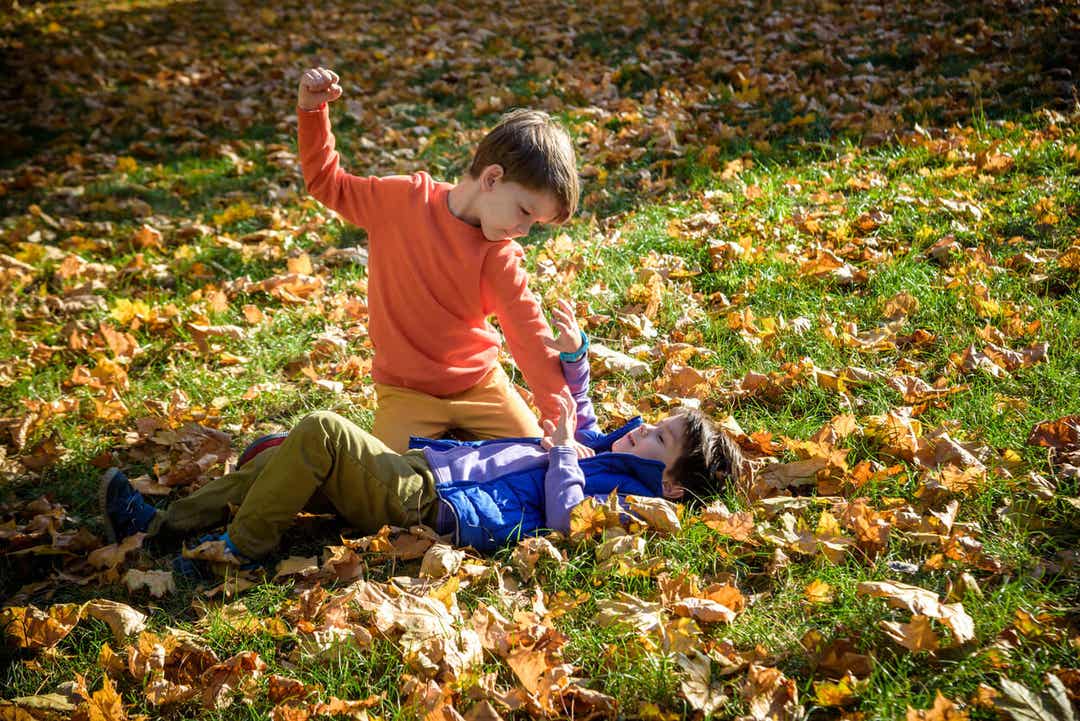Aggressive Behavior in Young Children: How to Act?


Written and verified by the psychologist Elena Sanz Martín
Aggressive behavior in children is one of the most striking and worrying for parents. When a child shouts, assaults, or acts in an out-of-control manner, it can cause tension and confusion in the adults in charge. In many cases, they aren’t sure how to respond to such behavior. Aggressiveness in young children is natural and we can expect it, within certain limits. So, generally, there’s no need to be alarmed. However, it’s essential to provide guidance to positively channel these impulses.
Behind all aggressive behavior, there are several causes that we need to address, rather than simply blaming or labeling the child. First of all, we must bear in mind that aggressiveness is common in preschool children. They haven’t yet developed the ability to control their impulses. And, at the same time, they haven’t yet learned alternative strategies with which to express and manage their frustration.
In addition, the conditions and environments in which the child grows up can provoke or increase this type of behavior. For example, when there’s an insecure attachment, the child doesn’t feel loved, and their needs aren’t met, aggressive behaviors may increase. Similarly, emotional distress doesn’t always present itself in anxious or depressive symptoms, but can also externalize itself through violent behaviors.

How to deal with aggressive behavior in young children
As we’ve already mentioned, it’s common for aggressive behavior to occur in younger children without this implying the existence of any type of disorder. However, the way in which the adult handles the situation can determine the resolution or maintenance of these behaviors. For this reason, we want to offer you some useful guidelines that you can put into practice on a daily basis.
Control your own reactions
Children learn to behave based on what they observe in their adults. So, it’s important that you lead by example and show your children ways to resolve conflicts and handle frustrations without violence. This is especially important when responding to your child’s aggressiveness: Maintaining serenity and composure will be fundamental.
Aggressive behavior: set limits firmly, clearly, and calmly
Aggressiveness in young children is something you can’t overlook. It’s important to guide and orient kids regarding which behaviors are acceptable and which aren’t. To do this, you need to establish clear rules and communicate them to the child so that they know what you expect of them.
In addition, it’s very positive to apply appropriate consequences. But don’t impose them as consequences but, rather, as a natural effect of their behavior. For example, leaving the playground if they assault other children instead of playing peacefully with them.
Direct the child towards alternative behaviors

Prevention can be key to avoiding aggressive behavior in children. So, if you perceive that your child is on the verge of inappropriate behavior, you can try to direct their attention to another stimulus or activity. But it’s also necessary to teach them other strategies to deal with anger or frustration. For example, negotiating, expressing themselves assertively, or using some simple relaxation exercise.
Aggressive behavior: praise positive behaviors
Many parents make the mistake of constantly pointing out their children’s inappropriate behaviors and reminding them what not to do. But it’s often more productive to point out and reinforce desirable attitudes and behaviors. This not only helps the child understand how to behave but also promotes the creation of more positive parent-child interactions and bonds.
When to consult a professional regarding aggressive behavior in young children
Although aggressiveness in young children is normal and to be expected, it can become pathological and indicate the presence of a behavioral disorder. It’s not always easy to identify when the line has been crossed. However, it’s important to look at the frequency, intensity, and evolution of these behaviors.
If they occur regularly, cause significant discomfort, produce major family and school conflicts, and don’t seem to improve with the measures you’ve implemented, it’s best to consult a professional. If intervention begins at an early stage, the results can be very positive.
Aggressive behavior in children is one of the most striking and worrying for parents. When a child shouts, assaults, or acts in an out-of-control manner, it can cause tension and confusion in the adults in charge. In many cases, they aren’t sure how to respond to such behavior. Aggressiveness in young children is natural and we can expect it, within certain limits. So, generally, there’s no need to be alarmed. However, it’s essential to provide guidance to positively channel these impulses.
Behind all aggressive behavior, there are several causes that we need to address, rather than simply blaming or labeling the child. First of all, we must bear in mind that aggressiveness is common in preschool children. They haven’t yet developed the ability to control their impulses. And, at the same time, they haven’t yet learned alternative strategies with which to express and manage their frustration.
In addition, the conditions and environments in which the child grows up can provoke or increase this type of behavior. For example, when there’s an insecure attachment, the child doesn’t feel loved, and their needs aren’t met, aggressive behaviors may increase. Similarly, emotional distress doesn’t always present itself in anxious or depressive symptoms, but can also externalize itself through violent behaviors.

How to deal with aggressive behavior in young children
As we’ve already mentioned, it’s common for aggressive behavior to occur in younger children without this implying the existence of any type of disorder. However, the way in which the adult handles the situation can determine the resolution or maintenance of these behaviors. For this reason, we want to offer you some useful guidelines that you can put into practice on a daily basis.
Control your own reactions
Children learn to behave based on what they observe in their adults. So, it’s important that you lead by example and show your children ways to resolve conflicts and handle frustrations without violence. This is especially important when responding to your child’s aggressiveness: Maintaining serenity and composure will be fundamental.
Aggressive behavior: set limits firmly, clearly, and calmly
Aggressiveness in young children is something you can’t overlook. It’s important to guide and orient kids regarding which behaviors are acceptable and which aren’t. To do this, you need to establish clear rules and communicate them to the child so that they know what you expect of them.
In addition, it’s very positive to apply appropriate consequences. But don’t impose them as consequences but, rather, as a natural effect of their behavior. For example, leaving the playground if they assault other children instead of playing peacefully with them.
Direct the child towards alternative behaviors

Prevention can be key to avoiding aggressive behavior in children. So, if you perceive that your child is on the verge of inappropriate behavior, you can try to direct their attention to another stimulus or activity. But it’s also necessary to teach them other strategies to deal with anger or frustration. For example, negotiating, expressing themselves assertively, or using some simple relaxation exercise.
Aggressive behavior: praise positive behaviors
Many parents make the mistake of constantly pointing out their children’s inappropriate behaviors and reminding them what not to do. But it’s often more productive to point out and reinforce desirable attitudes and behaviors. This not only helps the child understand how to behave but also promotes the creation of more positive parent-child interactions and bonds.
When to consult a professional regarding aggressive behavior in young children
Although aggressiveness in young children is normal and to be expected, it can become pathological and indicate the presence of a behavioral disorder. It’s not always easy to identify when the line has been crossed. However, it’s important to look at the frequency, intensity, and evolution of these behaviors.
If they occur regularly, cause significant discomfort, produce major family and school conflicts, and don’t seem to improve with the measures you’ve implemented, it’s best to consult a professional. If intervention begins at an early stage, the results can be very positive.
All cited sources were thoroughly reviewed by our team to ensure their quality, reliability, currency, and validity. The bibliography of this article was considered reliable and of academic or scientific accuracy.
- Londoño, L. V. (2010). Agresividad en niños y niñas, una mirada desde la psicología dinámica. Revista Virtual Universidad Católica del Norte, 1(31), 274-293. https://revistavirtual.ucn.edu.co/index.php/RevistaUCN/article/view/45/99
- Guerra, C., Campaña, M. A., Fredes, V., Gutiérrez, L., & Plaza, H. (2011). Regulación de la agresividad entre preescolares mediante el entrenamiento a madres y profesoras. Terapia psicológica, 29(2), 197-211. https://scielo.conicyt.cl/scielo.php?pid=S0718-48082011000200007&script=sci_arttext&tlng=n
This text is provided for informational purposes only and does not replace consultation with a professional. If in doubt, consult your specialist.








